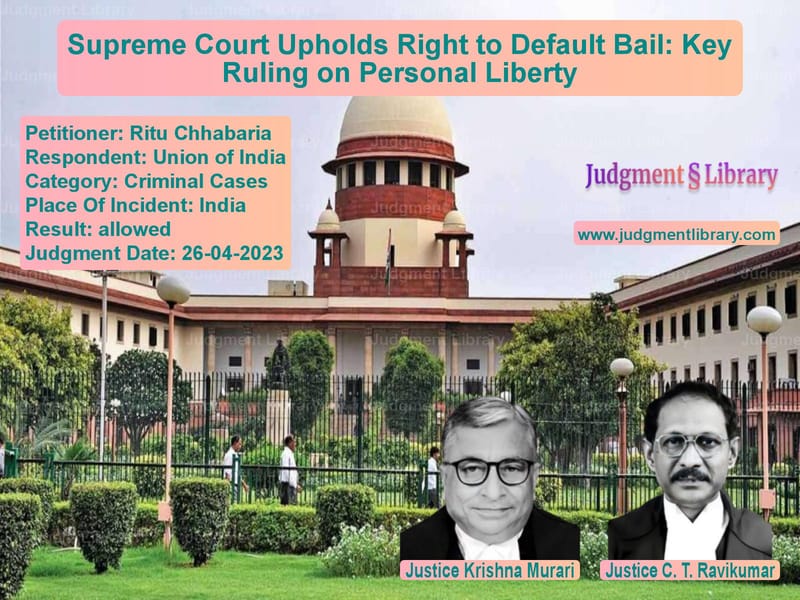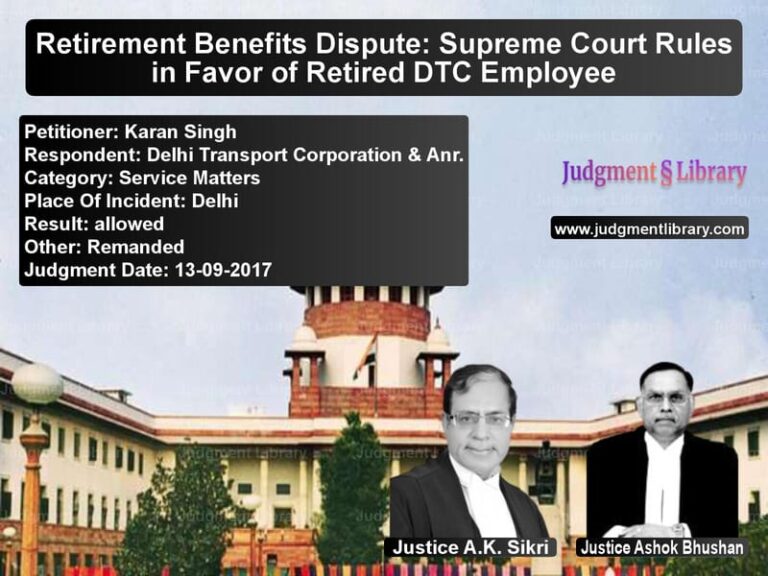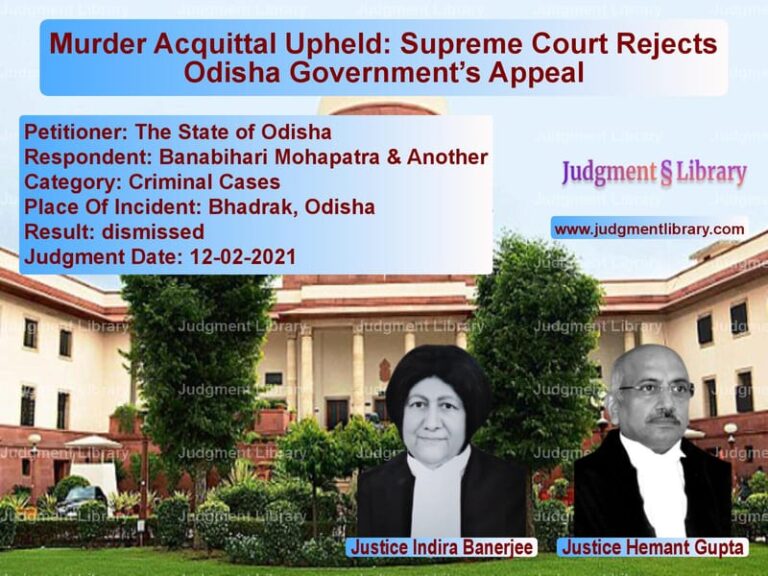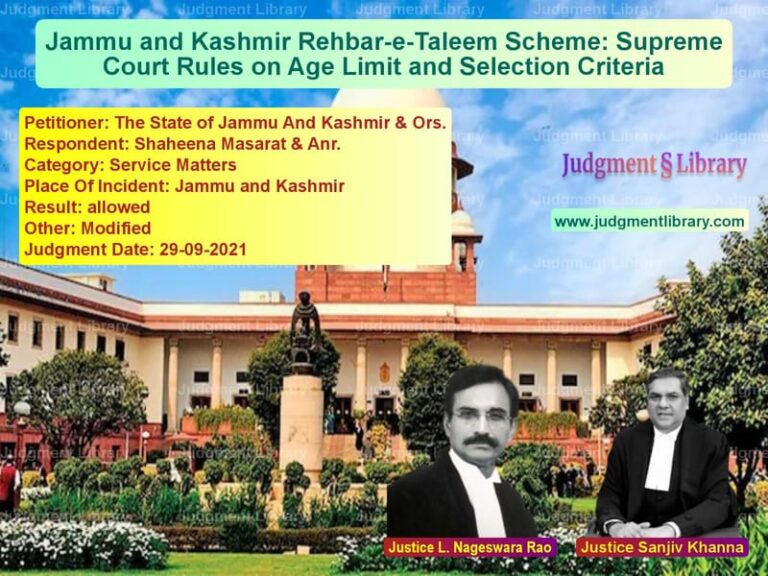Supreme Court Upholds Right to Default Bail: Key Ruling on Personal Liberty
The recent ruling in the case of Ritu Chhabaria v. Union of India has reaffirmed the fundamental right to default bail under Section 167(2) of the Code of Criminal Procedure (CrPC). The judgment emphasized the importance of personal liberty under Article 21 of the Constitution of India and ruled against the arbitrary practice of filing incomplete chargesheets to extend an accused’s detention.
Background of the Case
The case was brought before the Supreme Court by the petitioner, Ritu Chhabaria, seeking the release of her husband, who was denied default bail despite the investigation being incomplete. The legal dispute revolved around whether an investigating agency can file piecemeal chargesheets to prolong an accused’s detention beyond the prescribed period.
The accused was arrested on 28th April 2022 under charges framed under Section 120(B) read with Section 420 of the IPC and Sections 7, 12, and 13(2) read with Section 13(1)(d) of the Prevention of Corruption Act, 1988. Multiple supplementary chargesheets were filed, yet the investigation remained incomplete, preventing the accused from securing default bail.
Petitioner’s Arguments
The learned counsel for the petitioner contended that:
- The respondent admitted in the supplementary chargesheet that the investigation was still pending, and thus, the trial court should not have issued a remand order under Section 309 CrPC.
- Under CrPC provisions, an accused cannot be held in custody beyond 60 days if the investigation remains incomplete.
- Reliance was placed on the case of M. Ravindran v. The Intelligence Officer, Directorate of Revenue Intelligence, which reinforced the principle that default bail is an accused’s fundamental right.
Respondent’s Arguments
The government, represented by its counsel, argued:
- The writ petition was not maintainable, and the accused should have approached the High Court or filed a Special Leave Petition under Article 136 of the Constitution.
- The fact that the accused was not named in the FIR was irrelevant, as the FIR only sets the criminal procedure in motion.
- The supplementary chargesheet filed on 25th June 2022 was complete with respect to the accused, and thus, the accused was not entitled to default bail.
Key Legal Issues
The Supreme Court examined the following crucial issues:
- Can a prosecution agency file a chargesheet in piecemeal without first completing the investigation?
- Does the filing of such an incomplete chargesheet extinguish an accused’s right to default bail?
- Can the trial court continue remand beyond the stipulated period despite an incomplete investigation?
Supreme Court’s Observations
The Supreme Court categorically ruled against the misuse of supplementary chargesheets to circumvent the right to default bail. The Court held:
- “The Constitution entrusts this Court with the paramount duty of safeguarding civil liberties. A violation of personal liberty, as in this case, warrants judicial intervention.”
- “The right to default bail under Section 167(2) is a fundamental right, not merely a statutory privilege.”
- “The filing of an incomplete chargesheet, while continuing the investigation, cannot nullify an accused’s right to default bail.”
- “The State cannot deprive a person of liberty through procedural loopholes or by manipulating CrPC provisions.”
Precedents and Legal Analysis
The judgment relied on several landmark cases:
- K.S. Puttaswamy v. Union of India – Stressed that the rule of law must protect citizens from arbitrary state actions.
- Satender Kumar Antil v. CBI – Affirmed that Section 167(2) is intrinsically linked to Article 21, ensuring an accused is not detained indefinitely.
- Union of India v. Thamisharasi – Held that failure to complete an investigation within the prescribed period warrants the grant of default bail.
Final Ruling
The Supreme Court ruled in favor of the petitioner, holding that:
- Investigating agencies cannot indefinitely detain accused persons under the guise of pending investigations.
- Filing a supplementary chargesheet without concluding the investigation is a misuse of legal provisions.
- Failure to grant default bail in such cases violates fundamental rights under Article 21.
- The interim bail granted earlier was made absolute, and the petition was allowed.
Conclusion
This judgment is a landmark ruling reinforcing the importance of personal liberty and the right to default bail. It ensures that investigating agencies cannot manipulate procedural laws to detain individuals indefinitely. The ruling upholds the integrity of the judicial system and reaffirms the constitutional mandate that no person shall be deprived of their liberty without due process.
Petitioner Name: Ritu Chhabaria.Respondent Name: Union of India.Judgment By: Justice Krishna Murari, Justice C. T. Ravikumar.Place Of Incident: India.Judgment Date: 26-04-2023.
Don’t miss out on the full details! Download the complete judgment in PDF format below and gain valuable insights instantly!
Download Judgment: ritu-chhabaria-vs-union-of-india-supreme-court-of-india-judgment-dated-26-04-2023.pdf
Directly Download Judgment: Directly download this Judgment
See all petitions in Bail and Anticipatory Bail
See all petitions in Fundamental Rights
See all petitions in Custodial Deaths and Police Misconduct
See all petitions in Judgment by Krishna Murari
See all petitions in Judgment by C.T. Ravikumar
See all petitions in allowed
See all petitions in supreme court of India judgments April 2023
See all petitions in 2023 judgments
See all posts in Criminal Cases Category
See all allowed petitions in Criminal Cases Category
See all Dismissed petitions in Criminal Cases Category
See all partially allowed petitions in Criminal Cases Category







